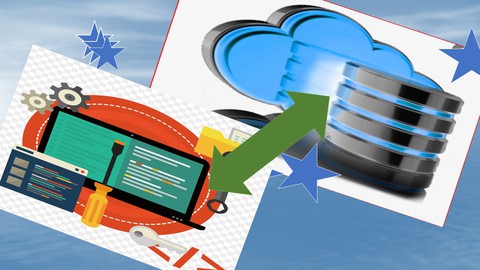
Oracle PL/SQL Fundamentals with Case Study (OCI)
Oracle PL/SQL Fundamentals with Case Study (OCI), available at $19.99, has an average rating of 4.5, with 46 lectures, 3 quizzes, based on 2 reviews, and has 10 subscribers.
You will learn about Oracle PL/SQL Programming Provisioning Oracle Cloud Autonomous Database with Oracle Cloud Infrastructure(OCI) Connecting to Cloud Autonomous Database using SQL Developer client. Case study to make understanding of PL/SQL better This course is ideal for individuals who are IT Analyst or IT Developer looking for career in Oracle PLSQL or Students in IT / Engineering / Management or Any one who have knowledge on SQL and wish to learn PLSQL It is particularly useful for IT Analyst or IT Developer looking for career in Oracle PLSQL or Students in IT / Engineering / Management or Any one who have knowledge on SQL and wish to learn PLSQL.
Enroll now: Oracle PL/SQL Fundamentals with Case Study (OCI)
Summary
Title: Oracle PL/SQL Fundamentals with Case Study (OCI)
Price: $19.99
Average Rating: 4.5
Number of Lectures: 46
Number of Quizzes: 3
Number of Published Lectures: 46
Number of Published Quizzes: 3
Number of Curriculum Items: 49
Number of Published Curriculum Objects: 49
Original Price: ₹799
Quality Status: approved
Status: Live
What You Will Learn
- Oracle PL/SQL Programming
- Provisioning Oracle Cloud Autonomous Database with Oracle Cloud Infrastructure(OCI)
- Connecting to Cloud Autonomous Database using SQL Developer client.
- Case study to make understanding of PL/SQL better
Who Should Attend
- IT Analyst
- IT Developer looking for career in Oracle PLSQL
- Students in IT / Engineering / Management
- Any one who have knowledge on SQL and wish to learn PLSQL
Target Audiences
- IT Analyst
- IT Developer looking for career in Oracle PLSQL
- Students in IT / Engineering / Management
- Any one who have knowledge on SQL and wish to learn PLSQL
The big question is – is SQL & PLSQL still relevant and should you learn it? Well, the answer is: Yes.
SQL & PL/SQL has established itself as the de-facto data access language used across many different industries, that’s available in the database.
This means that SQL & PL/SQL is no longer just used by developers, but folks from many different parallel technical fields that need to store, manipulate, and access large volumes of data – analyse it with slice and dice concept to derive meaningful business information so as to have the business in competitive edge.
For this reason, SQL and PL/SQL isn’t going anywhere. Its stable in popularity and still dwarfs NoSQL databases on a side by side comparison.
The advantage of PLSQL is
PL/SQL allows sending an entire block of statements to the database at one time. This reduces network traffic and provides high performance for the applications.
PL/SQL gives high productivity to programmers as it can query, transform, and update data in a database.
Applications written in PL/SQL are fully portable.
With this course, you can learn how to provision the latest Oracle Cloud Autonomous Database 19c which is provided on
Oracle cloud infrastructure as always free tier , utilize it to learn SQL (not covered in detail in this course ) and PL/SQL, which is covered in details.
The PL/SQL topics covered in this course are :
-
Different Oracle DB environment to Learn & Practice.
-
How to get access to Oracle Cloud Free tier.
-
An Overview about all new Oracle Autonomous Cloud Database.
-
Provisioning Oracle Autonomous Database on OCI
-
Accessing the Oracle Cloud Autonomous DB for SQL – web and client version – SQL Developer.
-
What is PLSQL?
-
Oracle PLSQL programming approach
-
Naming conventions and formatting.
-
Scope of variable declaration & nested block
-
Using PLSQL to interact with Oracle DB
-
Cursors in PLSQL.
-
Control Statement in PLSQL
-
Handling Exceptions in PLSQL
-
Subprograms & Composite data type
-
Database triggers.
-
Case study in SQL & PLSQL
-
Business case & problem statement provided in document format for the learner to work upon & provided solution.
-
Solutions presentation in detail to validate your solution.
Happy Learning!!
Course Curriculum
Chapter 1: Introduction
Lecture 1: Topics of Coverage – Course Introduction
Chapter 2: Oracle Environments Options
Lecture 1: Oracle Environment Options
Chapter 3: Getting Access to Oracle Cloud – Free tier
Lecture 1: Getting Access to Oracle Cloud – Free tier – Part 1
Lecture 2: Getting Access to Oracle Cloud – Free tier – Part 2
Lecture 3: Logging into Oracle Cloud
Chapter 4: What is Oracle Autonomous Database?
Lecture 1: What is Oracle Autonomous Database
Chapter 5: Provisioning Oracle Cloud Autonomous Database on Oracle Cloud Infrastructure.
Lecture 1: Provisioning Oracle Cloud Autonomous Database – Part 1
Lecture 2: Provisioning Oracle cloud Autonomous Database – Part 2
Chapter 6: Using different tools to access the Cloud autonomous Database
Lecture 1: Admin and Developer tools
Lecture 2: Using Oracle SQL Built in web tool on cloud to access autonomous DB
Lecture 3: Using SQL developer client
Lecture 4: Connecting to Oracle Cloud Autonomous DB (OCI) using Oracle SQL developer client
Lecture 5: Oracle Sample Dataset creation using Oracle APEX
Chapter 7: What is PL/SQL?
Lecture 1: What is PL/SQL
Chapter 8: PL/SQL Programming approach
Lecture 1: PL/SQL Programming – naming convention, comments and code formatting
Lecture 2: PL/SQL formatting using SQL developer tool
Lecture 3: Scope of variable declaration & nested block
Lecture 4: Scope of variable declaration & nested block – Demonstration
Chapter 9: Using PLSQL to interact with Oracle Database
Lecture 1: Using PLSQL to interact with Database
Lecture 2: PLSQL Interaction with Database – Demonstration
Chapter 10: Cursors in PLSQL
Lecture 1: Cursors in PLSQL
Lecture 2: Cursors in PLSQL – Demonstration
Lecture 3: Cursor FOR loop
Chapter 11: Control statements in PLSQL
Lecture 1: Control Statements in PLSQL
Lecture 2: Conditional statement in PLSQL – IF/THEN and Case
Lecture 3: Iterative Statement in PLSQL
Chapter 12: Using Exceptions in PLQL
Lecture 1: Understanding Exceptions handling
Lecture 2: Oracle defined exception handling
Lecture 3: Non pre-defined exception handling in Oracle PLSQL
Lecture 4: User defined exception handling
Chapter 13: Understanding Oracle PLSQL subprograms – procedure & functions
Lecture 1: Understanding PLSQL Subprograms – Procedure & Functions
Lecture 2: Oracle PLSQL – Procedure – Demonstration
Lecture 3: Oracle PLSQL – Function – Demonstration
Chapter 14: Composite Datatypes in Oracle PLSQL
Lecture 1: Composite Datatypes in Oracle PLSQL
Chapter 15: What are Oracle Triggers?
Lecture 1: Database triggers – An overview
Lecture 2: Database trigger – Demonstration
Chapter 16: Oracle SQL & PLSQL Case study.
Lecture 1: Oracle SQL Case study – Business case & Problem statement
Lecture 2: Oracle SQL Case Study – Solution Details
Lecture 3: Oracle PLSQL Case Study – Business case & Problem statement
Lecture 4: Oracle PLSQL Case Study – Solution Approach
Lecture 5: Oracle PSLSQL Case Study -Solution -Update of Requisition Delivery Date -Part 1
Lecture 6: Oracle PLSQL Case Study – Solution – Update Order columns – Part 2
Lecture 7: Oracle PLSQL Case Study -Solution -Invoice generation procedure -Part 3
Lecture 8: Oracle PLSQL Case Study – Solution – Trigger on Invoice table
Lecture 9: Oracle PLSQL Case Study – Solution – Package creation – Part 5.
Chapter 17: Concluding Remarks
Lecture 1: Concluding Remarks
Instructors
-
Guha Rajan M., B.Engg, MBA
Founder and CEO – Capstone Solutions, Trainer
Rating Distribution
- 1 stars: 0 votes
- 2 stars: 0 votes
- 3 stars: 0 votes
- 4 stars: 1 votes
- 5 stars: 1 votes
Frequently Asked Questions
How long do I have access to the course materials?
You can view and review the lecture materials indefinitely, like an on-demand channel.
Can I take my courses with me wherever I go?
Definitely! If you have an internet connection, courses on Udemy are available on any device at any time. If you don’t have an internet connection, some instructors also let their students download course lectures. That’s up to the instructor though, so make sure you get on their good side!
You may also like
- Best Investing Courses to Learn in March 2025
- Best Personal Finance Courses to Learn in March 2025
- Best Health And Wellness Courses to Learn in March 2025
- Best Chatgpt And Ai Tools Courses to Learn in March 2025
- Best Virtual Reality Courses to Learn in March 2025
- Best Augmented Reality Courses to Learn in March 2025
- Best Blockchain Development Courses to Learn in March 2025
- Best Unity Game Development Courses to Learn in March 2025
- Best Artificial Intelligence Courses to Learn in March 2025
- Best Flutter Development Courses to Learn in March 2025
- Best Docker Kubernetes Courses to Learn in March 2025
- Best Business Analytics Courses to Learn in March 2025
- Best Excel Vba Courses to Learn in March 2025
- Best Devops Courses to Learn in March 2025
- Best Angular Courses to Learn in March 2025
- Best Node Js Development Courses to Learn in March 2025
- Best React Js Courses to Learn in March 2025
- Best Cyber Security Courses to Learn in March 2025
- Best Machine Learning Courses to Learn in March 2025
- Best Ethical Hacking Courses to Learn in March 2025






















